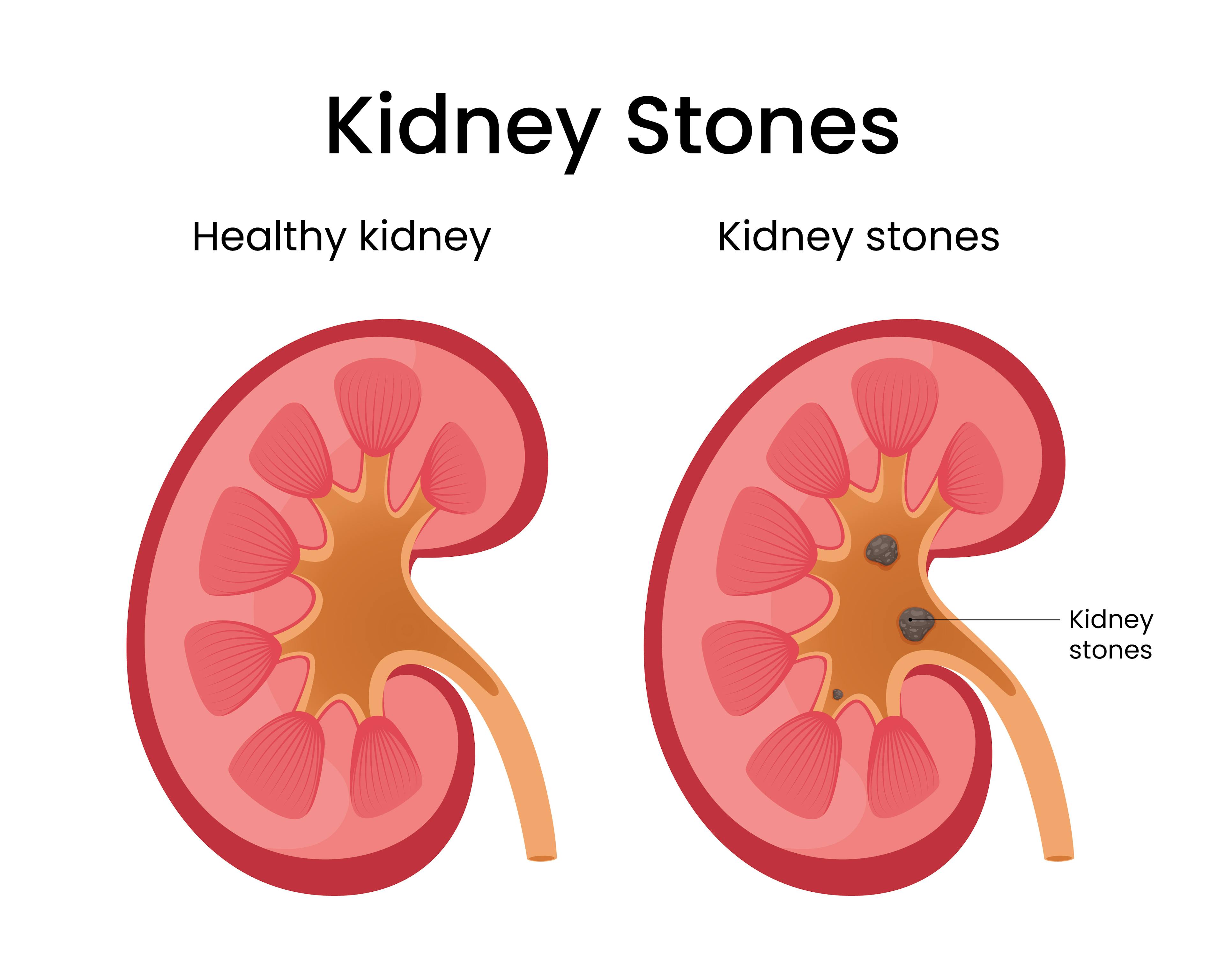Kidney stones affect about 1 in 11 people in the U.S., with a higher risk linked to obesity, diabetes, and diet. They are typically more common in men than women. Recent studies show a rise in kidney stone cases across diverse groups, likely influenced by lifestyle and dietary factors.
What are Kidney Stones?
Kidney stones are mineral and salt deposits that develop in the kidneys. They vary in size and can move within the urinary tract, which includes the kidneys, ureters, bladder, and urethra. Although some stones pass on their own, others may require medical intervention, especially if they cause pain, blockage, or infection.
Types of Kidney Stones
This type of kidney stone will influence treatment and prevention strategies. Common types include:
- Calcium Stones – These are the most common type, often formed from calcium oxalate or, less commonly, calcium phosphate.
- Uric Acid Stones – Uric acid stones are associated with diets high in protein and are more common in people who lose a lot of fluid or have certain metabolic conditions.
- Struvite Stones – Typically formed in response to infections, especially urinary tract infections (UTIs), struvite stones can grow rapidly and become quite large.
- Cystine Stones – Cystine stones are rare and often result from a hereditary disorder that causes the kidneys to excrete excessive cystine.

What Causes Kidney Stones
Kidney stones develop when there is an imbalance in the minerals and salts in your urine. Factors that may increase the risk include:
- Dehydration: Concentrated urine due to insufficient fluid intake allows minerals to crystallize and form stones.
- Dietary Factors: High intake of oxalate-rich foods (like spinach), salt, or animal proteins can increase the likelihood of kidney stones.
- Genetics: Family history can play a role, as some people inherit a predisposition to form kidney stones.
- Certain Medical Conditions: Conditions such as obesity, diabetes, hyperparathyroidism, and recurrent UTIs increase the risk of stone formation.
Treatments for Kidney Stones
Treatment for kidney stones varies, depending on the type and cause of the stone.
Options include:
- Hydration and Pain Management: Small stones often pass naturally with increased hydration and over-the-counter pain relievers.
- Prescription Medication: For stones causing discomfort or difficulty passing, alpha-blockers such as tamsulosin can relax the muscles in the urinary tract, facilitating stone passage.
- Extracorporeal Shock Wave Lithotripsy (ESWL): This non-invasive procedure uses sound waves to break down stones, making them easier to pass.
- Ureteroscopy: Often a good option for small stones, in this procedure, a small scope is inserted into the bladder and ureter to locate, capture, or break up stones in the ureter or kidney.
- Percutaneous Nephrolithotomy: In this procedure for large kidney stones, a small incision in the back allows access to the kidney to remove the stone. This is typically reserved for stones too large or too complex for other less invasive treatments.
How to Prevent Kidney Stones
Preventing kidney stones involves lifestyle changes and, in some cases, medications. Here are steps that may help reduce your risk:
- Stay Hydrated: Drinking enough fluids to produce at least 2 liters of urine daily dilutes minerals and can prevent crystal formation.
- Limit Oxalate and Sodium: Foods high in oxalate (such as nuts, chocolate, and beets) can increase the risk of stones. Reducing salt intake can also help prevent stone formation.
- Eat a Balanced Diet: A diet rich in fruits and vegetables and limited in animal protein may lower your risk.
- Maintain a Healthy Weight: Excess weight can increase your risk of kidney stones.
- Get a 24-Hour Urine Test – If you’ve had multiple kidney stones, a 24-hour urine test is recommended to identify mineral imbalances, allowing for targeted changes in diet and medication to prevent recurrence.
For personalized advice, consult one of our urologists or a dietitian who can guide you in making specific dietary adjustments.
When to Seek Treatment for Kidney Stones
Recognizing when to seek timely intervention can reduce complications. Symptoms may vary depending on the stone's size and location.
Seek immediate medical attention if you are experiencing:
- Sharp, severe pain: Often starting in the back or side, pain may radiate to the lower abdomen or groin as the stone moves.
- Frequent urge to urinate: You may feel an increased urgency or need to urinate more frequently.
- Blood in urine: Known as hematuria, blood can make urine pink, red, or brown.
- Nausea and vomiting: The intense pain can trigger nausea and vomiting in some individuals.
- Burning with urination: In certain situations, infection of the urinary tract may present along with a stone passing.
If these symptoms occur, a urology specialist can perform tests to diagnose kidney stones and determine the most appropriate treatment.
FAQs
Untreated kidney stones can lead to complications such as urinary tract infections, kidney damage, and, in severe cases, kidney failure.
Small stones may pass on their own within a few days to weeks, while larger stones often require medical treatment.
Diagnosis may include blood and urine tests, imaging such as a CT scan or ultrasound, and stone analysis to determine the type of stone and guide treatment.
Yes, kidney stones can obstruct the urinary tract, creating an environment where bacteria can grow, potentially leading to infections.
Foods high in oxalates, salt, and animal proteins can increase the risk of kidney stones. Reducing intake of these foods may help in prevention.
For more information on kidney health, explore our Guide to When to See a Urologist or Urology Services. If you suspect kidney stones or need expert guidance, CLS Health is here to provide compassionate, effective care tailored to your needs.



